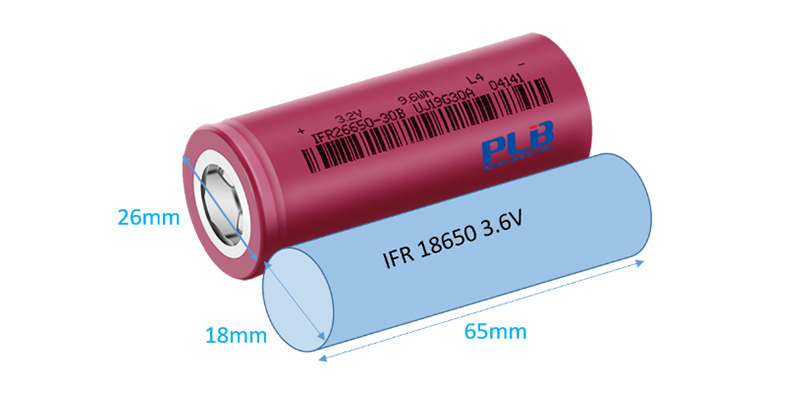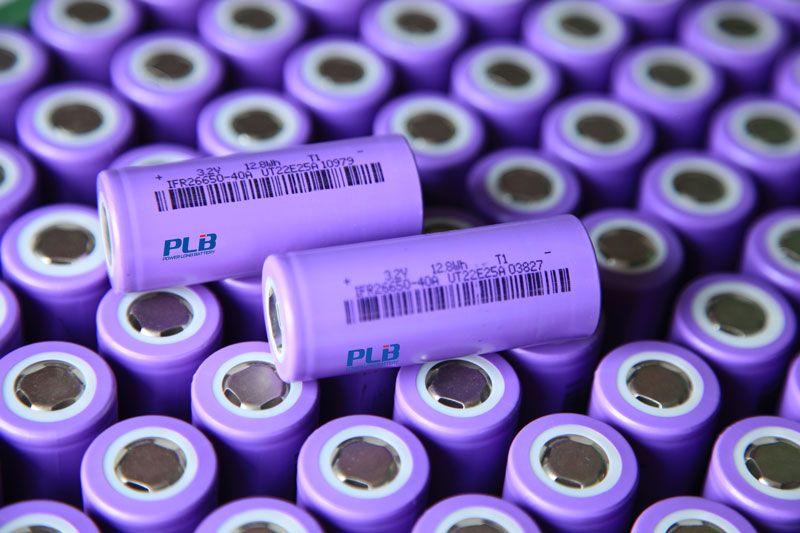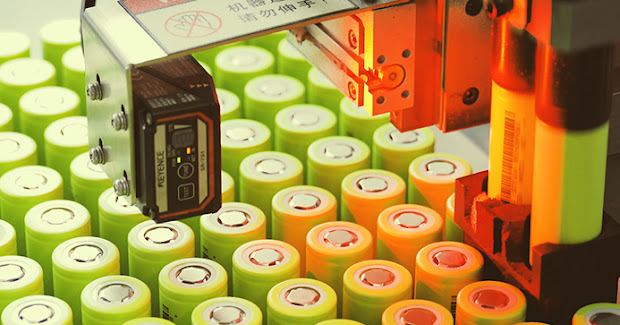26650 battery vs 18650 battery, which is better?
26650 battery and 18650 battery
26650 and 18650 cells are a kind of cylindrical lithium batteries, both are mostly used in ternary lithium, lithium iron phosphate power batteries and have a place in the market. Most of 26650 battery are rechargeable LiFePO4 batteries. While most of 18650 battery are rechargeable ternary lithium batteries.
Perhaps you can guess from the “name”,26550 cell is 65 mm in length and 26 mm in diameter. As you can tell from below picture, 18650 cell and 26650 cell have same length of 65mm, but the diameter is shorter, just 18 mm.

Performance
It is well known that the cell is the foundation of the battery and the performance of the cell is related to the performance of the battery pack. Cell performance is determined by many aspects, the most fundamental and most important of which is safety.
Safety
Compared to ternary lithium-ion batteries, lithium iron phosphate batteries have higher safety because they use lithium iron phosphate as the positive electrode material, which has higher chemical stability and is less prone to safety issues such as thermal runaway.
In addition, charge and discharge rate performance, capacity, cycle life and others is also crucial.
Capacity
In general, the 18650’s capacity range is 1200mAh to 3600mAh, but the range of 26650’s can achieve 2500mAh to 4000mAh. See below picture. This means that a single 26650 cell can store more energy than a 18650 cell. The energy density of ternary lithium material is generally higher than that of lithium iron phosphate. Therefore, lithium iron phosphate is often used to make larger 26650 size cells, which have unique advantages over smaller 18650 cells.

Discharge rate:
Discharge rate refers to the current required when the battery releases its rated capacity within a specified time, 1C is numerically equal to the rated capacity of the battery, usually represented by the letter C. If the nominal rated capacity of the battery is 10Ah, 10A is 1C.
The discharge rates are classified as follows:
Low (< 0.5C), medium (0.5-3C) high(3.5-7.0C)super(>7.0C)
Generally speaking, 26650 lithium-ion batteries have a higher discharge rate than 18650 batteries. This means that they can deliver more power over a shorter period of time.
Cycle life
Cycle life refers to the times of a battery charge and discharge cycles. A cycle is from one full charge to one full discharge. The lifespan of a Lithium Iron Phosphate (LiFePO4) battery is typically between 3000 to 6000 cycles, with an annual decay rate of around 2%. In contrast, the lifespan of a Ternary Lithium Ion battery is typically between 800 to 2000 cycles, depending on the materials and operating conditions.
It’s important to note that the lifespan of a battery is affected by various factors, including usage patterns, charging and discharging rates, temperature, and storage conditions. In addition, the actual lifespan of a battery may vary depending on the specific brand, quality, and manufacturing process of the battery.
Application
In battery industry, 18650 lithium-ion battery is the most versatile size with mature technology. It is widely used in many rechargeable battery applications such as lighting lamps, processing lithium batteries, laptops, manufacturing equipment, electric vehicle charger batteries, and more. On the other hand, the 26650 lithium-ion battery is a less common size compared to the 18650. It is larger in size, which means it has a higher capacity and can deliver more power. As a result, 26650 batteries are often used in power tools, lighting, energy storage, UPS backup power supply, AGVs, medical equipment, and other fields that require high-capacity and high-power batteries.
Which is better?
In summary, the optimal battery type to use is determined by individual requirements and preferences. Currently, 18650 rechargeable batteries are more widely used and established in the market. While 26650 rechargeable batteries are high-performance and high-capacity batteries that can better serve high-drain devices. Ultimately, the selection of the battery type should be based on specific needs, taking into account factors such as capacity, discharge rate, cycle life, and other performance characteristics.
Source of the article: 26650 battery vs 18650 battery, which is better?

评论
发表评论